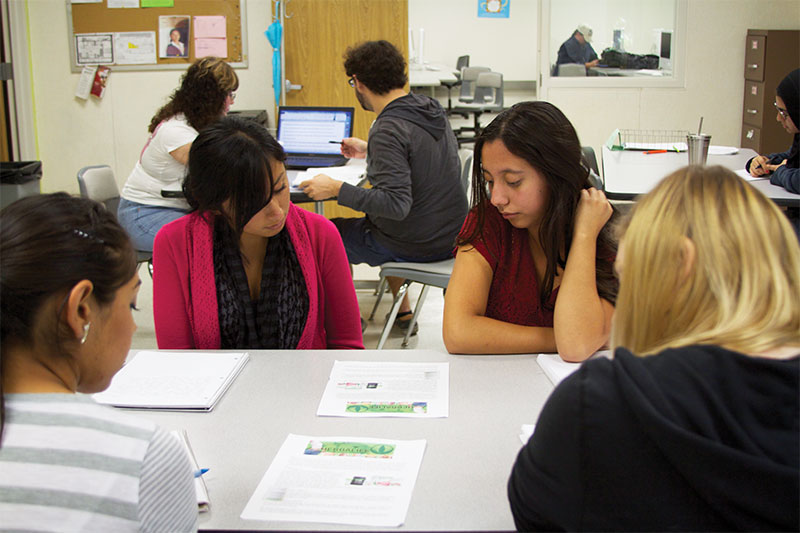
There are several ways for students to get academic help on campus, but academic support coordinator at the Learning Center, William Hardaway, said many students are still forgoing tutoring.
“We always run across people months — or sometimes years — after they’ve taken a course who say, ‘I wish I had known about this,’” Hardaway said. “The Learning Center is often mentioned but students don’t have a clear picture of exactly what goes on until they experience it. Then they say, ‘I wish I would’ve come.’”
The Learning Center offers comprehensive academic support in 20 subjects including: physics, math and chemistry. There are three programs within the learning center: tutoring, supplemental instruction, and SupportNet.
Tutors provide one-on-one help to students for an hour at a time at the basement floor of the library.
Supplemental instruction is a series of weekly study sessions for students enrolled in a specific course.
“We recruit a student who has taken a specific course with a specific instructor,” said Hardaway. “That student will sit through the course again and take notes as if they’ve never taken it before. Then they will prepare lessons and teach study sessions.”
SupportNet is an academic coaching program within the Learning Center. Here students receive academic counseling, take learning assessments, develop study skills and realistic study expectations and learn time management techniques.
“We take the time to sit down and talk to students,” said graduate intern at SupportNet, Tom Pao. “We assess what the problem is with them and we find the best resource to help them succeed in school. Maybe they don’t have a career path, so we’ll send them to the career center. Maybe they need help with math, so we’ll refer them to tutors at the Learning Center.”
Students are often referred to SupportNet by professors, but individuals can make appointments themselves by calling the SupporNet office at (559) 278-8370.
“Everybody at Fresno State is welcome to use SupportNet,” Pao said. “We get students that are not sure how to prepare for tests or aren’t sure how to manage their time. We sit down with them and we talk with them and see what areas they need more assistance in. We give them resources and guides to see other ways of attacking the problem.”
Separate from the Learning Center is another tutoring center run by the College of Arts and Humanities, the Writing Center.
“Students from all majors and all years of schooling are welcome in the Writing Center,” said assistant director Kirk Stone.
The Writing Center, like the Learning Center, is separated into three programs: small writing groups, one-on-one tutoring and online tutoring.
Small writing groups are biweekly, 50-minute sessions where three students and a tutor work on writing at the writing center. Students who are part of small writing groups get one unit of academic credit. They get no homework from the group, only focusing on papers assigned from other classes and sample papers.
During online tutoring, students email drafts of their work to be read and edited by a tutor within two business days.
“That can be convenient for students who are commuting or working off campus,” Stone said. “But it’s harder to work on some things when you’re not chatting with them live. It’s harder to work on polishing. That’s better one-on-one, in person.”
One-on-one tutoring is held at the writing center in ED 184 of the education building.
Stone said every student can benefit from tutoring.
“A lot of people think you go to a tutor because you’re a bad writer,” Stone said. “So the assumption is that if you were a competent student, a ‘good’ writer, then you would never need to come to the Writing Center.
“But that’s not true. Do you think J.K. Rowling or Stephen King just wrote in their office and didn’t get feedback from anyone? They have editors that give feedback on every single thing they’ve written. So the Writing Center is not for bad writers, it is for all writers.”
For graduate students who need help in writing, the Graduate Writing Studio offers coaching on master’s theses and extensive graduate assignments.
“We focus on what we call ‘higher-order concerns,’ which has to do with structure, organization, content and idea development,” said Chuck Radke, the dissertation and thesis consultant at the studio. “We don’t focus too terribly on lower-order concerns, like mechanical errors, fragments, run-ons or those types of things.”
Radke said that they focus less on copy editing and more on teaching.
“We call ourselves an empowering service as opposed to an editing service,” he said. “We won’t do the editing for you, but we’ll teach you how to identify errors and then how to fix them.”
Graduate students can make an appointment with the Graduate Writing Studio by calling (559) 278-2450 or visiting the Graduate Study Center on the second floor of the library.
Undergraduate students can contact the Learning Center at (559) 278-3052 and the Writing Center at (559) 278-0334 to make tutoring appointments.




